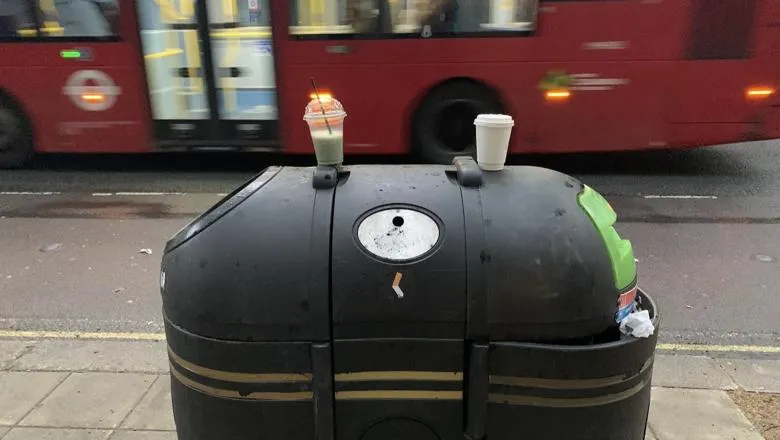30 April 2024
COMMENT: 'Polite littering' is a rubbish problem - here's why the British approach to tackling clean ups is not working
By Dr Randa Kachef
Since moving to London almost a decade ago, I’ve always been struck by the drink tins, sandwich packs and free newspapers draped on and wedged in every nook and cranny of this beautiful city.

I’ve coined the phrase “polite littering” to represent rubbish that has been left like this, without people even realising they’re littering. This could be why communications that ask people not to litter when they don’t know they are littering, are simply ineffective, and can discredit the efforts of people cleaning up our public spaces.
The act of littering has always fascinated me and I’ve never thought it was OK to throw rubbish on the ground. Most people in the UK agree – 95% consider a clean environment to be important. This may seem like a very positive outlook, but street cleaners report having to collect a staggering 2 million items of litter a day, costing UK taxpayers over £1 billion a year.
Despite the perception that littering is bad, the UK’s litter rates continue to rise. Littering fines in England recently increased from £150 to £500, while campaign groups such as Keep Britain Tidy regularly launch anti-littering communication drives and have organised clean-up initiatives for 70 years.
This dichotomy inspired my PhD. Since the 1970’s, academic research has tried to quantify the effectiveness of anti-littering techniques. But this approach misses a vital step in the scientific process – to understand exactly how litter is created before intervening.
In my research, I have taken a step back from what experts think they know about this behaviour to observe littering in action. I have spent six years watching and documenting the way people dispose of their waste in London, Brighton, Manchester and Birmingham. I have discovered that not all litter is intentionally littered.
Litter is typically defined as being scattered about by people flagrantly throwing rubbish on the ground. But if a bin cannot be found, some people find creative ways to dispose of their rubbish, leaving it neatly on top of salt and grit bins, window ledges, garden bushes or bin bags awaiting collection.
Cigarette butts – the most littered item in the world – are often disposed of by flicking away as part of the smoking ritual. Aside from that, almost half of the non-cigarette littering I witnessed seemed “polite” – instead of intentionally throwing items on the ground, people would place their rubbish neatly on or around bins or bin-like structures.
I regularly observed people seeking out a bin to throw away an empty drinks can, while immediately littering their cigarette. So while people may understand the need to avoid littering, there’s a fundamental disconnect – they won’t necessarily consider cigarette butts as litter, despite them containing toxic chemicals and plastic microfibres.
Improving rubbish campaigns
Politely littered items can get knocked over by a strong gust of wind. Neat piles of waste might collapse when someone else adds another item to it. Often, this rubbish ends up on the ground alongside other litter, by which time, the original offender is well on their way, completely unaware that their actions have contributed to litter in the more conventional sense.
So much of the litter in the streets is generated completely by accident. About a fifth of the littering I observed happened with the individual being completely unaware. Lightweight, low cost and small items such as hair ties, face masks and till receipts are regularly dropped accidentally when people are rummaging through their pockets or handbags.
Once politely littered, rubbish can be further littered by animals too. Bags of rubbbish left next to full bins ready for collection can easily get ripped up and scattered by scavenging foxes at night. Cleaning staff then report having to pick up litter, managers read these reports and assume littering is the issue. But when litter is created this way, intent and outcome are wildly disconnected. In reality, larger bins with greater capacity and more regular cleaning schedules would improve the situation.
Unfortunately, when litter is created unintentionally, it still has the same detrimental effect on the environment, and it also makes it more likely other people will litter as well.
Many councils are increasingly removing bins to encourage people to take their rubbish home and hopefully reduce littering. This is not a reasonable expectation, especially in busy tourist areas where home may not be nearby or for people with leaky, messy rubbish they need to dispose of while out and about. Waste removal services need to be better matched to binning needs, particularly in highly littered areas and during peak times.
Ultimately, the act of littering needs a re-brand. Campaigns would do well to stop assuming that litter equals littering. All forms of improper waste disposal, including well-intentioned polite littering and accidental contributions, must be linked to the litter problem.
This article is republished from The Conversation under a Creative Commons license. Read the original article



